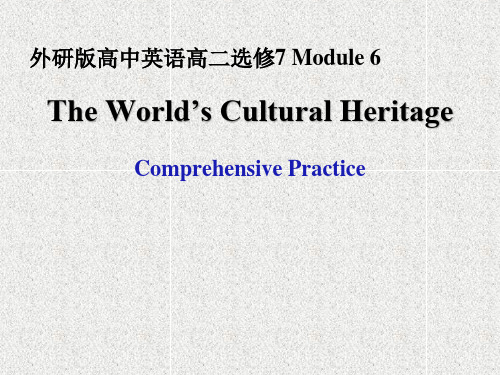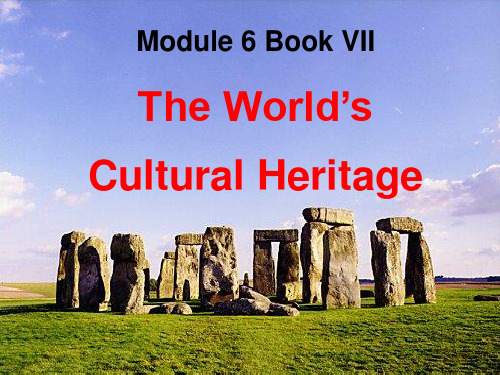英语周报2016-2017学年高二外研版选修七:Module 6 课件 Grammar 精品
- 格式:ppt
- 大小:1.19 MB
- 文档页数:61






CHECKING CORNERPart 1 INTRODUCTION & VOCABULARY AND READINGI. 根据下面各句句意以及所给单词的首字母或汉语提示词,写出该单词的正确形式(每空一词)。
1. The film is being shown again by popular ________ (请求).2. As is known to all, plenty of fresh air c________ to good health.3. In p________ societies, people used stones as weapons to hunt animals.4. We were anxious to ________ (保存) the original character of the house.5. It is strongly r________ that the machines should be checked every year.6. After four months in a foreign country, every hour at home was p________ to me. II. 用括号内单词的正确形式填空。
1. ________ (expose) to strong sunlight is harmful to your skin.2. Anne ________ (sharp) her pencil and began to do her homework.3. The company provides advice and ________ (assist) in finding work.4. Last month we paid a visit to the ________ (remain) of ancient Rome.5. Do you know how the universe first came into ________ (exist) long ago?6. The group is trying to raise public ________ (aware) about homelessness.7. A(n) ________ (agree) was finally reached between management and employees.8. The fossils that were newly found may tell us more about human ________ (evolve).III. 根据汉语意思补全下面句子(每空一词)。
Module 6 The World’s Cultural Heritage第Ⅰ卷第二部分:阅读理解(共两节,满分40分)第一节(共15小题;每小题2分,满分30分)阅读下列短文,从每题所给的四个选项(A、B、C和D)中,选出最佳选项。
AMichelle was a student at University of California, Los Angeles. She is here to tell us how she feels about the city.What were the best things about Los Angeles?One of my favorite things about Los Angeles is the weather. I hate the cold and it never really gets that cold there. Plus, most of the time it’s usually sunny, which is good because I love going to the beach during the summer. There’s so much to do at the beach, but my favorite thing in L.A. was having a picnic on the sand with my friends.What were the worst things about being there?I disliked having to drive everywhere to get around because the city is so spread out. Los Angeles has a lot of traffic and sometimes it takes a long time to get somewhere close by just because the streets are so crowded. Also, a lot of people complain about the pollution.Did you have any problems there?Just the normal problems of living in any city, like watching out for pickpockets (扒手). Some people think Los Angeles has a lot of crime, but I think it’s as safe as any other city. Also, many people think driving is difficult because there is a lot of traffic and road rage (路怒症), but it just takes a little practice and a lot of patience. What are the people like in Los Angeles?There are all types of people in Los Angeles since the city is pretty diverse. For the most part, though, most of the people are friendly, calm and relaxed. Some people say that everyone in Los Angeles is beautiful, but I think that’s just a stereotype (模式化的印象).Would you go back to Los Angeles?Certainly. Los Angeles is one of my favorite cities in the world. I love the fact that it has all the nightlife and shopping of a big city, but also has access to beaches, parks, mountains and other places you can’t usually find in large cities. Between the weather and the beaches and all the fun things to do, it’s a great place to be.21. We can learn from the text that Michelle _____.A. hates the heavy traffic in Los AngelesB. dislikes the cold weather in Los AngelesC. thinks Los Angeles is small and crowdedD. enjoys driving everywhere in Los Angeles22. What’s Michelle’s impression o f the people in Los Angeles?A. They get angry easily.B. All sorts of people live there.C. They are patient and amusing.D. Everyone is kind and beautiful.23. How does Michelle find Los Angeles?A. Safe but noisy.B. Relaxing but busy.C. Polluted and dangerous.D. Diverse and interesting.24. We learn from the text that _____.A. Michelle was born in Los AngelesB. Michelle loved the life in Los AngelesC. Los Angeles has many traffic accidentsD. Michelle has no plan to return to Los AngelesBEvergreen Teen Book Club OfferThe Evergreen Teen Book Club invites you to join us and take full advantage of our limited-time introductory offer.If you join our club, you will receive a certificate for 3 free books. These are yours to keep, even if you decide to cancel your membership. However, if you decide to purchase just one book at the regular club price, you will receive a certificate for an additional 3 free selections after your first order is placed.As our member, you can benefit from all of our super sales and our Bonus Program. You accumulate 2 bonus points with each cash purchase of one book. Every 6 bonus points will earn you a certificate for one free book!To join our club, fill in the brief application listing your name, address, and phone number on the postage-paid card at the bottom of this page. Then drop the card in the mail and our present catalog will be immediately mailed out to you for your 3 free selections!This catalog offers a wide selection of over 500 books in every issue, including mysteries, adventures, biographies, cookbooks, sports, and many more. Our catalog also contains interviews with your favorite authors, reviews of newly published novels, and a teen top-ten list for both fiction and nonfiction.Once you are a member, you will receive our catalog monthly, but you don’t need to purchase any selections. We send you only exactly what you order.If you join before June 30th, we will also provide complimentary shipping (免费送货), even if you choose to order nothing except your 3 free books.You can build a great book collection!Begin now by taking advantage of this great offer.25. If you join the Evergreen Teen Book Club, you can _____.A. buy books at cost priceB. receive a gift after each orderC. expect 3 free books each monthD. get one free book for a cash purchase of 3 books26. If Lily wants to get free delivery, she should _____.A. join the club before June 30thB. accumulate 6 bonus pointsC. order at least 3 booksD. purchase the catalog27. The purpose of the text is to get more people to _____.A. collect books for the clubB. learn from famous writersC. read different kinds of booksD. join the club and order booksCDarek Fidyka, a 38-year-old Bulgarian, had been paralysed (瘫痪的) from the chest down for four years after a knife attack. Scientists from Britain and Poland took cells from his nose, transplanted (移植) them into his back and re-grew his spinal cord (脊髓). Now he can walk and even drive a car. The doctors were delighted but said it was the first step in a long journey.The breakthrough came after 40 years of research by Professor Geoff Raisman, who found that cells had the possibility to repair damage to nasal (鼻腔的) nerves, the only part of the nervous system that constantly (不断地) re-grows. “The idea was to take something from an area where the nervous system can repair itself, and does so throughout life, and put it into an area that doesn’t repair itself,” Professor Raisman said.Polish doctors injected the nasal cells into Mr Fidyka’s spinal cord above and below the injury and used some nerves from his ankle to form a bridge across the damaged tissue. The nasal cells appear to have caused the spinal nerves to repair themselves.Professor Raisman achieved this with rats in the late 1990s, but this is his greatest success. “I think the moment of discovery for me was Christmas in 1997 when I first saw a rat that couldn’t control its hand put its hand out to me. That was an exciting moment, because I realised then that my belief that the nervous system could be repaired was true.”Doctors chose the easiest case for their first attempt — it might not work for others. But there is a real sense of hope that an idea once thought impossible has been realised.David Nicholls, who helped provide money for the breakthrough, said information about the breakthrough would be made available to researchers across the globe.“What you’ve got to understand is that for t hree million paralysed people in the world today, the world looks a totally brighter place than it did yesterday,” he said.28. Why did Professor Geoff Raisman choose cells from the nose?A. The nervous system in the nose can repair itself.B. Cells in the nose can be easily transplanted.C. Cells in the nose re-produce rapidly.D. He just wanted to give it a try.29. Why did the operation work for Darek Fidyka?A. The nasal cells re-produced and spread quickly.B. The nerves from his ankle helped cure the injury.C. The nervous system in the spinal cord can repair itself.D. The nasal cells helped the spinal nerves to repair themselves.30. What made Professor Geoff Raisman believe the nervous system can be repaired?A. His study on animals.B. His operation on a paralysed patient.C. His sudden thoughts about Christmas.D. His unusual experience with a sick rat.31. David Nicholls’ words suggest that _____.A. the world is becoming better and brighterB. paralysed people have the hope of recoveryC. the report of the breakthrough will be published soonD. researchers across the globe will carry out the operationDThe Regional Director of the National Heritage Conservation Commission (国家遗产保护委员会) Kagosi Mwamulowe said the Barotse Plains is unique (独特的) and it deserves to be on the list of the World Heritage Sites.Mr. Mwamulowe said the Barotse Plains deserves to be included on the World Heritage List because it has a rich cultural heritage which includes the burial sites of former (以前的) kings.The Director said he hoped that the landscape would be declared as a heritage site next year in June. He also said it was important to protect Zambia’s unique culture for education and entertainment.Chief Natural Heritage Officer Muyumbwa Ndiyoi said there will be a lot of benefits when the Barotse Landscape is declared a World Heritage Site because it will attract many tourists and business investments will increase.Mr. Ndiyoi said the site will also benefit young people as knowledge will be passed down from generation to generation.He was reacting to a question from Nalolo District Labour Officer Jason Ngoma who wanted to know how the people of Western Province will benefit once the Barotse Landscape is declared a World Heritage Site.And University of Zambia Lecturer Charles Namate said there is a need for the site to be included on the World Heritage List because 50 years after its independence Zambia only has one heritage site, which is the Victoria Falls.Lecturer Namate said the Barotse Landscape was facing a lot of environmental degradation (恶化), and that’s why there is a need to recognize the value of its landscape and the memories of dead kings.The National Heritage Conservation Commission together with the Ministry of Chiefs and Traditional Affairs are in Western Province to hold meetings with Heads of Government Departments. The Commission also held closed-door meetings with the Litunga Lubosi Imwiko II of the Barotse Royal Establishment.32. What do we know about the Barotse Plains?A. It has royal tombs.B. It is being well protected.C. It is not far from the Victoria Falls.D. It’ll be listed as a World Heritage Site soon.33. Mr. Ndiyoi believes that if the Barotse Plains is declared a World Heritage Site,_____.A. it won’t benefit the people of Western ProvinceB. it will attract many foreign students and researchersC. it will contribute to the local economic developmentD. more people will start to learn about Zambia’s culture34. In the text, Lecturer Namate expressed his concern about _____.A. the future of the Barotse PlainsB. the development of Western ProvinceC. the development of tourism in ZambiaD. the environmental problems of the Barotse Plains35. What can we infer from the text?A. Zambia only has two World Heritage Sites.B. The Barotse Landscape has been partly destroyed.C. The Barotse Landscape issue is still being discussed.D. Young people in Zambia don’t know about Barotse culture.第二节(共5小题;每小题2分,满分10分)根据短文内容,从短文后的选项中选出能填入空白处的最佳选项。
Module 6 The World’s Cultural Heritage I. 单元教学目标II. 目标语言III. 教材分析和教材重组1.教材分析该模块以world’s herita ge为话题,重点介绍了苏州园林(classical gardens in Suzhou)、北京周口店猿人遗址(Beijing Man Heritage Site)、英格兰的石林(stonehenge)、美国新墨西哥州的Santa Fe treasures等世界性文化遗产。
旨在让学生通过该模块的学习,了解世界各地珍贵自然、文化遗产,懂得这些古代遗产的发掘和保护对人类文明发展的重要意义。
同时,本模块还要求学生掌握demand, insist, propose, request, suggest等动词后从句中虚拟语气的用法;地点、条件、让步状语从句的用法;并掌握not to worry, as long as, no wonder, no one know for certain, had better等日常用语的用法。
1.1 INTRODUCTION 重点学习有关人类自然、文化遗产的基础词汇及表达法。
并以classical gardens in Suzhou为例,介绍了联合国教科文组织世界文化遗产委员会苏州会议、世界文化遗产保护条例。
1.2 VOCABULARY AND READING重点介绍了the amazing caves of Zhoukoudian与Beijing Man Heritage Site in Danger,让学生了解我国在世界文化遗产保护方面所做出的贡献等背景知识。
1.3 GRAMMAR(1)重点学习demand, insist, propose, request, suggest等动词后从句中虚拟语气的用法。
该部分设计了三个活动:活动1要求学生观察并总结出所供5个例句中动词的用法特点;活动2要求学生通过选择与上述5个句子意义接近的句子进一步理解这一类句式所表达的真正含义;活动3要求学生使用demand, insist, propose, request, suggest这些词汇改写句子,掌握虚拟语气在这些动词后从句中的用法。